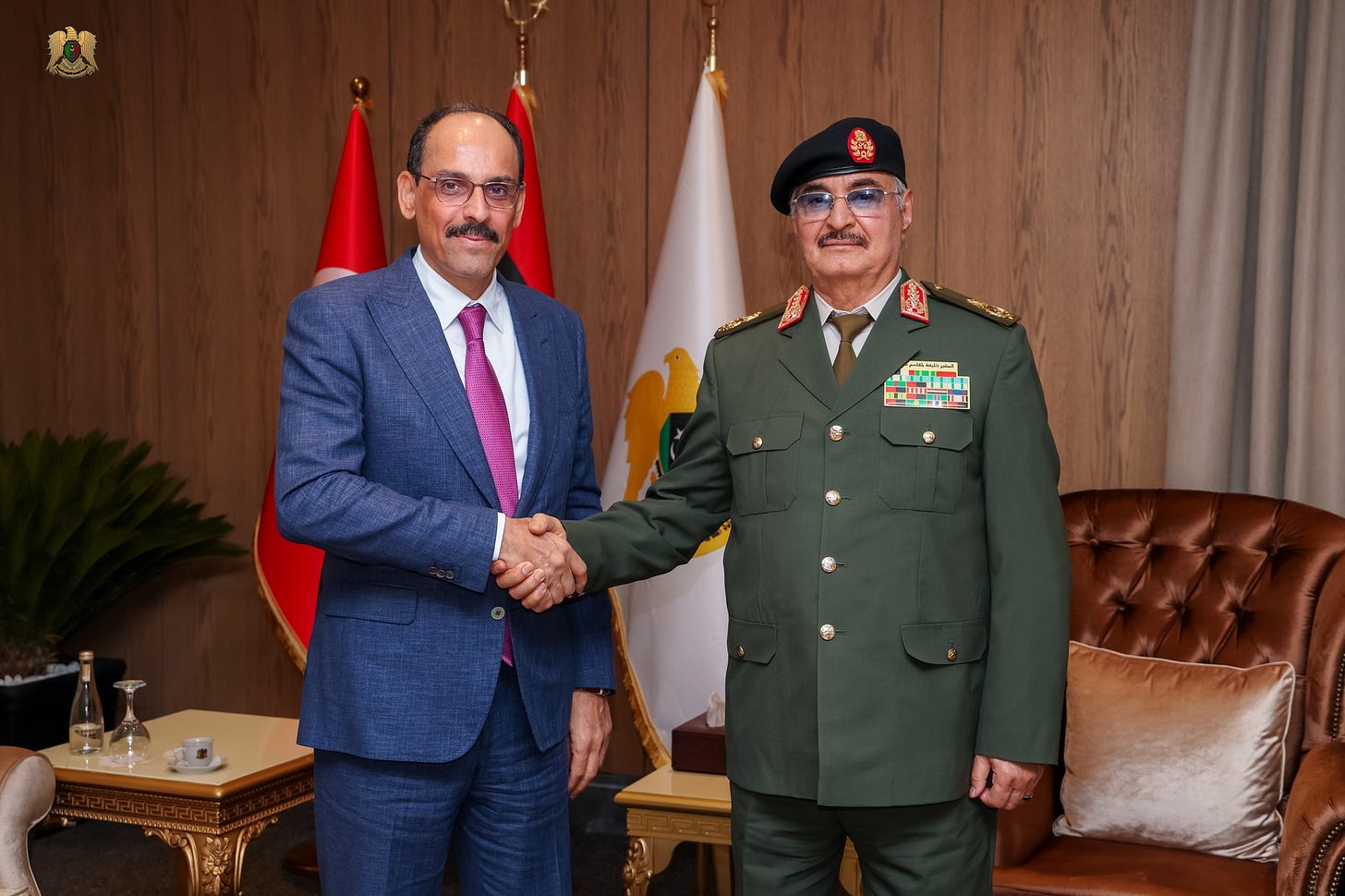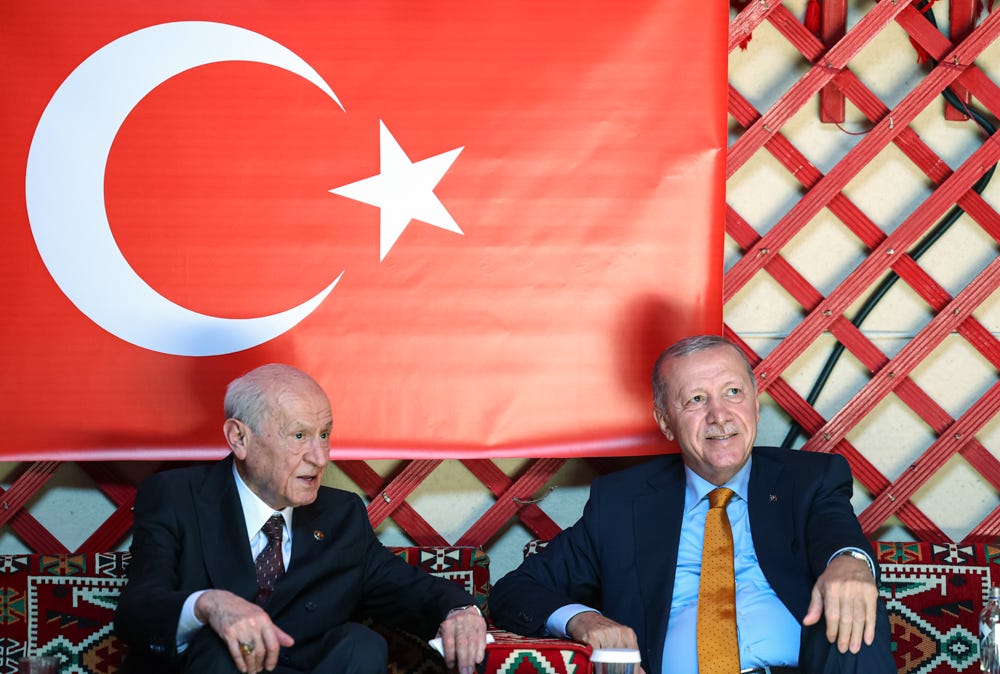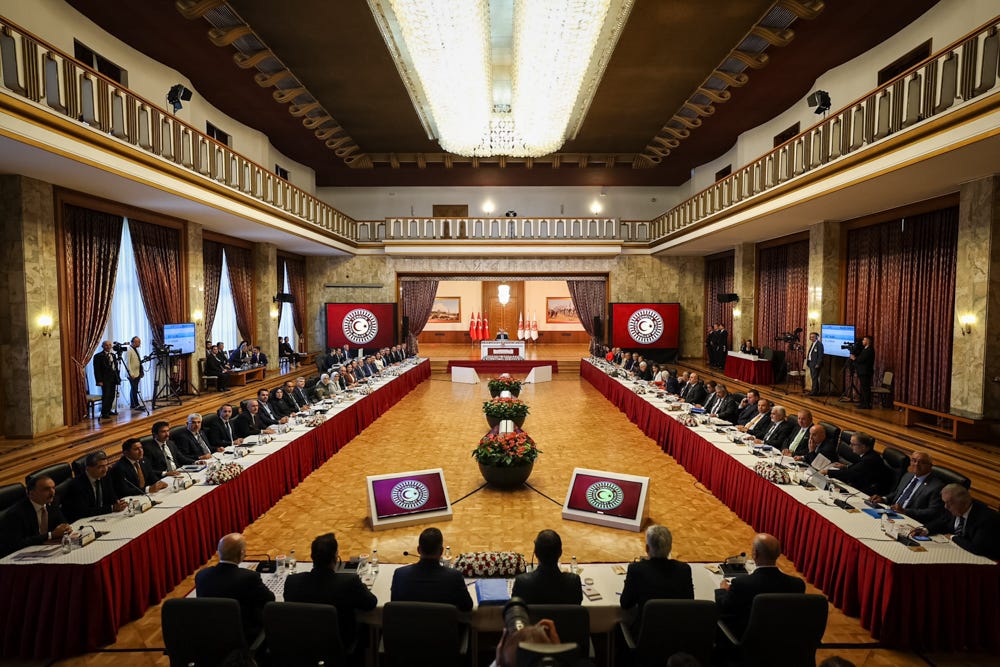We’re back! And ready to catch you up on all things Turkey after a break best represented by this German shepherd on a jetski in Elazığ – because we live fur the moment.
To start with a bang, this newsletter is open to all readers. We work hard to filter the chatter from what matters in Turkish politics, foreign affairs and business news. If you like what you see, consider becoming a paid subscriber and take advantage of our …
Back-to-work discount! Save 25 percent on annual subscriptions with a purchase before midnight Aug. 31. Students and TL-earners can save 50 percent here.
In this week’s recap:
Turkey, US wary of Syria transition
PKK peace process updates
CHP investigations snowball
Domestic and diplomatic wraps
Animal welfare activists activate
Also from us:
Daniel Thorpe & Andrea Lazzaroni on Syrian repatriations from Turkey
Anna Montraveta Riu & Laia Palau Biel on quake zone relocation efforts
Andrew Finkel on media capture and media culture on Recap radio
Next week: Neslihan Çevik joins our podcast to dig into Turkey’s falling birth rates. Watch the livestream here Monday, Sept. 1 at 1600 TRT / 0900 EDT.
Now, where were we? Since our last recap on Aug. 8, Turkish politics stayed on course, Pres. Erdoğan took 10 days off and Syria became more of a hot mesh than the tapestry often referenced by US special envoy Thomas Barrack, who has since picked up new metaphors.
There is reason for concern. After regime change last year, the government in Damascus has yet to bring armed groups under its command as occasional clashes threaten to destabilize a fragile transition process.
That’s the case with the Kurdish-led SDF, which both Damascus and Ankara accuse of foot-dragging on the March 10 agreement to integrate with the central government.
Failure to do so, observers fear, could lead to new conflicts in a region already grappling with multi-front wars as Turkey and Israel compete to shape the new Syria – where six soldiers died in Israeli drone strikes near Damascus Tuesday.
To go in chronological order, Syrian Pres. Ahmed al-Sharaa’s government pulled out of planned talks with the SDF in Paris earlier this month, citing a Kurdish-led conference involving Syrian minority communities. Both sides instead met Aug. 11 in Damascus, reportedly to stem clashes in Aleppo.
In a joint presser with Syrian FM Asaad al-Shibani on Aug. 13, Turkish FM Hakan Fidan claimed Israel and the SDF were undermining Syrian transition efforts, accusing Kurdish forces of “playing for time.”
"In an environment where Turkey's security demands remain unmet, we have no chance of remaining calm," Fidan said.
The same day, Turkish Defense Min. Yaşar Güler met his Syrian counterpart in Ankara, where the two signed an MOU for “Joint Training and Advisory Cooperation.” Details remain sparse, but Damascus requested Turkish support in strengthening its military capacity in July.
Last week, defense ministry officials expanded on the MOU, telling reporters the agreement involves “the restructuring of the Syrian Armed Forces … training, consulting, technical support and reciprocal visits … in coordination with the Syrian Defense Ministry.”
On parallel tracks, Syria’s FM met Aug. 20 with an Israeli delegation in Paris to de-escalate bilateral tensions. Also, a US delegation met with both Sharaa and SDF head Mazloum Abdi Monday as Damascus and the Kurdish-led admin trade accusations over the organization of upcoming parliamentary elections in Syria.
The US position remains crucial for Syria’s future and Amb. Barrack appears to have softened his support for a highly centralized state following violence in Sweida. He recently told reporters:
“Not a federation but something short of that [might work], in which you allow everybody to keep their own integrity, their own culture, their own language, and no threat of Islamism … I think everyone is saying we need to figure out a way to be more reasonable.”
Regarding the future of the US-SDF partnership, some US forces withdrew from Kurdish-held areas, but there were “no changes to the relationship between US and partner forces in the counter-ISIS fight in Syria,” according to a quarterly report by the US Dept. of Defense published in July.
Meanwhile, the US Congress requested a briefing next year on a “potential US defense partnership with the Syrian government.”
Analysis: Özgür Ünlühisarcıklı, Ankara director for the German Marshall Fund, said he does not expect Turkey to act unilaterally if Damascus-SDF talks continue to falter.
“Ankara would follow Damascus' lead,” Ünlühisarcıklı told Turkey recap. “So, if Damascus wants to continue negotiating, Ankara won't just go ahead and do anything by itself.”
“And Damascus is not only listening to Turkey. They'll also be talking to the US [and] Saudi Arabia, of course … the situation is now more complicated,” he continued, referencing talks between Sharaa’s government and Israel. “The US is trying to create a new modus operandi between the two.”
Still, Ünlühisarcıklı said Ankara may seek to intervene in Syria on two correlated conditions: If the SDF refuses to implement the March 10 agreement and/or the PKK peace process hits a dead end (more below).
“I wouldn't rule out a Turkish operation, but I don’t think we are there yet,” he said.
Commission creep: PKK peace process updates
Speaking at the anniversary of the 1071 Battle of Manzikert, as Pres. Erdoğan does every August, the Turkish leader focused on national unity with nods to the PKK peace process and Kurds in both Syria and Turkey.
“Turkey is the guarantor of the security, peace and well-being of the Kurds, just like all brotherly peoples in Syria,” Erdoğan said. “Those who turn toward Ankara and Damascus will win.”
He continued with the usual pro-Muslim, anti-colonial talking points on the peace process, adding:
"We have covered significant ground over a short time in the [process] we initiated to completely tear down the walls of sedition built between the individuals of our nation.”
Depending on who’s speaking, the Turkey-PKK peace process is either making irreversible progress or doomed to fail, but the reality, as in all polarizing topics, usually lies somewhere in the middle with plenty of nuance.
Following Fidan’s warnings on SDF integration above, DEM Party spox Ayşegül Doğan replied:
“The foreign minister is not using language appropriate to the process. We believe Hakan Fidan is opting for demagoguery.”
Rhetoric aside, work continued in the parliamentary commission tasked with overseeing the process, despite the burning car outside the building on Aug. 19 – a possible reference to enforced disappearances in the 1990s, though officials described the act as a mental health event.
The commission redistributed the three seats left empty by IYI Party (in protest), with the AKP, CHP and DEM taking one each. The commission also heard from the mothers of fallen Turkish soldiers and Kurdish militants, though Kurdish language testimonies were neither allowed nor recorded in the official minutes.
At the time of writing (today), the commission began its 7th meeting with testimonies from former parliamentary speakers. Separately, the DEM Party delegation was visiting PKK leader Abdullah Öcalan on Imrali island.
What’s next: In a TV broadcast this week, DEM Party Co-Chair Tülay Hatimoğulları said the commission should meet directly with Öcalan. DEM’s other co-chair, Tuncer Bakırhan, echoed the call.
In response, AKP sources told the BBC: “If the commission takes a decision, it will be discussed." The same report highlights fractures in the CHP on how to approach the proposition and the process, more broadly.
In other diplomatic news:
Turkish delegation builds ties with Eastern Libya as intel chief Ibrahim Kalın and defense officials visited Benghazi on Aug. 25. The high-level talks support Ankara’s dual-track strategy to foster relations with both the Gen. Khalifa Haftar and the Tripoli-based government. Haftar’s son, Saddam Haftar, visited Ankara earlier this year.
Turkey gauges peacekeeping mission in Ukraine as peace remains elusive following the Aug. 15 Alaska Summit between Trump and Putin. Last week, a Turkish Defense Ministry official said a ceasefire was a prerequisite for a Turkish mission.
While mistrust remains high between Ankara and NATO allies, Turkey’s potential role may include sending troops away from contact lines, though with approval from both Kyiv and Moscow, according to the BBC.
ICYMI: Turkey welcomed Armenia-Azerbaijan peace efforts after the leaders of both nations met Trump in Washington to sign a declaration on Aug. 8. Though the text does not carry the legal force of a treaty, it finalizes negotiations on a peace agreement from last March.
In sum: Both nations agreed to recognize each other’s sovereignty and borders, withdraw from the OSCE Minsk Group and establish a Zangezur Corridor under the new acronym, TRIPP, or the Trump Route for International Peace and Prosperity, to complement Georgia’s Middle Corridor Route, and possibly one-up Tbilisi’s George W. Bush Street.
What to watch: Turkey broke ground Aug. 22 on a railway connection to Azerbaijan's Nakhchivan exclave, which will connect TRIPP to Europe via Anatolia. Armenian PM Nikol Pashinyan last week said negotiations were under way to open the Armenia-Turkey border. He also signed trade accords with Iran’s Pres. Masoud Pezeshkian.
For further reading on the Aug. 8 declarations, we recommend these analyses by Chatham House, Jamestown Foundation and Central Asia-Caucasus Institute.

Center of detention: CHP investigations snowball
Speaking of Turkey’s main opposition party on Aug. 11, MHP Chair Devlet Bahçeli again called on Turkey’s judiciary to conclude the countless investigations into CHP municipalities.
The party has faced a slew of corruption allegations this year and CHP chair Özgür Özel responded with appreciation for Bahçeli’s comments.
"Mr. Bahçeli and the MHP's deputy chairs have been making statements for some time now calling for common sense and reminding us of what needs to be done,” Özel told reporters on Aug. 12. “Let me reiterate. We're not avoiding prosecution, investigation or inspectors, but we're fed up.”
He added: “With the end of the judicial recess [on Aug. 31], indictments should be issued and the trial phase should begin. They have devastated the legal system.”
Rhetoric aside, detentions continued as about 30 people were taken into police custody on Aug. 12 for alleged corruption investigations into the Istanbul and Antalya municipalities.
Notably, CHP’s Beyoğlu District Mayor Inan Güney was arrested Monday Aug. 18 with 20 other officials, after three days in detention. Güney was replaced by his deputy chair Sefer Karaahmetoğlu on Aug. 22.
For those keeping track, another lawyer working for jailed Istanbul Mayor Ekrem Imamoğlu was detained Tuesday, and journalist Murat Yetkin made a nice map of all the changes of power across the country since the March 2024 elections.
In other domestic news:
Elected officials played musical chairs in August, which saw an unusually high number of lawmakers resign, switch parties or get expelled. To review:
CHP’s Aydın Metropolitan Municipality Mayor Özlem Çerçioğlu transferred to the AKP, prompting backlash from CHP voters.
She was one of 6 CHP officials, 2 IYI officials and one independent official that transferred to the AKP ahead of the party’s 24th anniversary.
CHP also lost an Ardahan district mayor, and gained a Yozgat district mayor following the dissolution of Memleket Party.
Two MHP municipal council members resigned in Pazaryeri, Bilecik.
DEM’s co-mayor in Silopi, Şırnak, was expelled.
Eight IYI Party Mardin officials resigned over the party’s peace process stance.
Lawyer Mücahit Birinci resigned from the AKP after Özel accused him of seeking a bribe in an Istanbul municipality investigation. Birinci was released on probation.
Turkey doubles down on domestic defense as TOKI, the state housing authority, announced plans Tuesday to build modern bomb shelters in all Turkish provinces, citing various war scenarios and impending doom.
Erdoğan followed up Wednesday by inaugurating a “steel dome” air defense system, which may pose technical challenges given Turkey’s surface area, as FPRI Pres. Aaron Stein told us on Recap radio.
A new #MeToo movement is unrolling in Turkey centered on harassment, sexual assault and blackmail in the entertainment industry. Over 100 photographers, musicians, actors and other cultural figures have been accused of exploiting their positions. Follow Susma Bitsin for details.
Getting a fair eşek: Animal welfare activists activate
And, as any tourist will notice, many people in Turkey love stray animals, often giving them special attention not extended to neighbors, family and other humans, in general.
So, it’s no surprise to see outrage about cat traps in a Bursa mall or street dog round-ups in Istanbul. Along similar protective tendencies, a monk seal got its own resting area on a Datça beach this week.
Still, some asses will test the limits of our fragile co-existence, like this stray donkey who ran a-foal of the Edirne bus station while commuters shrugged. Elsewhere:
A Diyarbakır village banned shorts, saying they make “families and elders uncomfortable.”
The transport minister was fined 9,267 TL for posting a video of himself driving 225 kph or 140 mph.
The justice minister upped penalties for celebratory gunfire at weddings as two people died from just that in the last two weeks.
Some see a sidewalk, others see a side hustle in stealing pavement stones.
Some see a tire, rope and turşu bidon, others see a washing machine.
Finally, if a tourist faces arrest for a flag pole dance video in Cappadocia, and another one followed Google Maps directions into fairy chimneys, are we allowed to say smart phones can ruin “the travel experience”? ATTN: Gen Z.
Speed reads
Turkey detains defence firm Assan Group executives in military espionage probe (Reuters)
Turkey’s religious authority issues sermon opposing equal inheritance for daughters (Bianet)
Russian swimmer missing after cross-Bosphorus race in Turkey (AP)
Romania seeks to expand Black Sea task force with Turkey, Bulgaria (Reuters)
Ten suspects wanted on Interpol red notice extradited to Turkey (AA)
With waters at 32C, Mediterranean tropicalization shifts into high gear (AFP)
Drought depletes Turkey's Tekirdağ reservoirs, forcing emergency water curbs (Reuters)
‘Proxy war’ – Turkish TikTok makeup row exposes tensions with German diaspora (Guardian)
Weekend reads
Alignment of Necessity: Turkey’s Role in the Future European Security Architecture
Analysts Sinem Adar, Hürcan Aslı Aksoy and several CATS Network contributors outline a recent series of security reports, concluding the EU “should progressively expand economic, security and defence cooperation with Turkey”, separate defense and security cooperation from EU accession process and strictly apply “arms export governance” on Turkey. (CATS Network)
Can Turkey Deliver on Its Armament Ambitions?
Historian Ryan Gingeras writes: “A quick look at the numbers seems to tell a clear story of the country’s upward trajectory” but “Much of what promises to be at the forefront of Turkish defense capability is still in development, meaning that it is too soon to say how sophisticated or dependable Turkey’s growing arsenal will be.” (FP)
Moderation Without Transformation: Why Turkey Is Failing Syria’s Postwar Transition
Analyst Salim Çevik argues: “Western actors—who have so far viewed HTS’s transformation as a strategic gain, especially in light of its disengagement from the Axis of Resistance and its growing openness to normalization with Israel—must recognize that authoritarian stability is neither sustainable nor benign.” (Arab Center)
To Halt the Jihadist Advance in Somalia, Work with Turkey and the UAE
Analyst Ido Levy writes: “Ultimately, the Turkish and Emirati initiatives stand out as the most extensive and scalable training missions … their performance in Somalia might also show whether they are able to take on bigger roles in other areas of U.S. interest, such as maritime security and Syria. (WI)
Freedom of Religion in Turkey: Foreign Policy Implications
In his testimony to the US Commission on International Religious Freedom, analyst Soner Çağaptay said in the AKP era conservative Turks “began to enter the middle class and climb up the ladder of political power, [and] the European identity that Ataturk grafted onto the nation became thinner with each passing decade, eventually falling away.” (WI)
Week ahead
Aug 30 Victory Day marks the last battle in the Greco-Turkish War
Aug 31 CHP holds a rally in Sinop province
Turkey recap is an independent, reader-supported newsletter that helps people make sense of the fast-paced Turkey news cycle. Contact us: info@turkeyrecap.com.
Subscribe here on Substack (or on Patreon for discount options). Paid subscribers get full access to our recaps, reports, members-only chat and news tracking tools.
Turkey recap is produced by our staff’s non-profit association, KMD. We are an affiliate of the Global Forum for Media Development and aim to create balanced news that strengthens local media by supporting journalists in Turkey.
Diego Cupolo, Editor-in-chief
Emily Rice Johnson, Deputy editor
Günsu Durak, Turkey recap Türkçe editor
Ceren Bayar, Parliament correspondent




